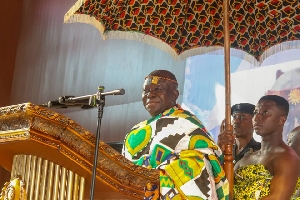General News of Wednesday, 27 January 2021
Source: GNA
Parents urged to provide nose masks for pupils/students
Mr Charles Abani, the United Nations Resident Coordinator in Ghana, has stressed the need for parents to take up the responsibility of providing adequate nose masks for children to keep them safe in school.
He said though it was important for the government to provide schools with Personal Protective Equipment (PPE), it was the responsibility of parents to arrange for some nose masks to protect children.
They should also teach them proper handwashing skills and how to observe social distancing at all times.
“When we describe free education, we often assume that everything is free, it’s not, and fundamentally, parents still have a responsibility to protect their children,” Mr Abani stated.
The UN Resident Coordinator in Ghana said this in Accra on Tuesday when he toured two schools in the La Nkwantanang Madina Municipal Assembly to access the level of adherence to the COVID-19 safety protocols.
He was accompanied by Madam Anne-Claire Dufay, Country Representative for the United Nations International Children's Emergency Fund (UNICEF) and Niyi Ojoulape, Country Representative for the United Nations Populations Fund (UNFPA).
Madam Angela Trenton-Mbonde, the Country Representative for UNAIDS and Mr Abdourahamane Diallo, United Nations Educational, Scientific and Cultural Organization (UNESCO), were also part of the team.
They visited the Legon Presbyterian Boys School and the LA- Nkwantanag D/A 1and Two Primary and Junior High School.
During the visit, the heads of the various UN Agencies interacted with the pupils to find out what they knew and how they were coping with studies and the pandemic
They also educated them on the COVID-19 prevention protocols.
Mr Abani said what was important in combatting the virus and ensuring the safety of children while in school was the behavioural change, which should start from the home.
He stressed the need for government to invest in digital learning, saying, “The truth is we are all faced with a pandemic we are still learning about. In this challenging time, we have to adopt local solutions, and I appeal to both parents and teachers to also consider ways to provide ad-hoc innovative solutions to help decongest classrooms, without increasing risk of the pandemic,” Mr Abani said.
Niyi Ojoulape, the Country Representative for the UNFPA, said the Agencies’ visit was to interact with students to know how they felt to be back to school and how they were coping with studies.
“It is also to give us clear information and a fair idea of how we can support the students and the government in terms of the policy to make education and learning much better for students,” he said.
He advised pupils and students to keep observing the COVID-19 protocols and make hand-washing part of their everyday life.











